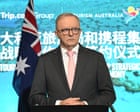
In a climate of increasing geopolitical tension, Australia has made clear its commitment to maintaining a balanced stance regarding a potential conflict between the United States and China over Taiwan. Prime Minister Anthony Albanese and Defence Industry Minister Pat Conroy have emphasized Australia’s desire for peace and stability in the Indo-Pacific region, echoing the United States’ own approach of “strategic ambiguity.” This means Australia will not commit in advance to joining any hypothetical military engagement concerning Taiwan.
As discussions continue over the Aukus pact, where Australia is set to acquire nuclear-powered submarines with technological support from the United States and the United Kingdom, there have been reports of Washington seeking assurances from Canberra regarding its response to potential conflict scenarios. However, Australian leaders have consistently highlighted the importance of non-committal diplomacy to avoid inflaming tensions and preserve regional harmony. The notion of strategic ambiguity supports their intention to prevent any pre-emptive military commitments that could exacerbate the situation.
The statements from Albanese and Conroy come in the wake of ongoing strategic maneuvers in the region. Australia’s call for peace and security underscores a broader strategic policy that prioritizes diplomatic engagement and preparedness without aggressive posturing. This stance attracts appreciation for its measured diplomacy amidst the surrounding complexities of international relations.
In parallel with these developments, Ukraine’s President Volodymyr Zelensky has embarked on significant government restructuring, including appointing a new prime minister, Yulia Svyrydenko. Born on December 25, 1985, in Chernihiv, Svyrydenko holds a degree in Economics from the National University of Trade and Economics in Kiev. Her appointment marks a new chapter in Ukrainian politics, reflecting a youthful and determined leadership approach as the nation continues to navigate its challenges. Svyrydenko’s background and experience, including her studies in Portugal, bring a fresh perspective to Ukraine’s ongoing efforts to strengthen its governmental resilience.
This reshuffle and Australia’s diplomatic stance both emphasize the nuanced complexity of international politics today. As nations strive to protect their interests, they also seek harmony in a rapidly evolving global landscape. Through strategic ambiguity and thoughtful leadership appointments, countries like Australia and Ukraine underscore the importance of balanced diplomacy and progressive governance.
Overall, the actions and policies highlighted in these developments present a composed and harmonious approach to the delicate state of international affairs. Amid potential conflict flashpoints, they demonstrate a global commitment to fostering understanding and mitigating tensions, safeguarding peace, and ensuring stability for the future.
Source: {link}
